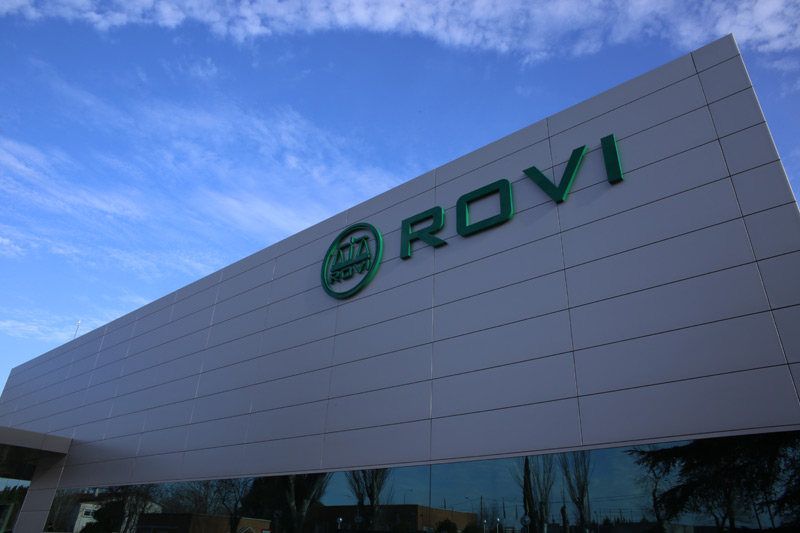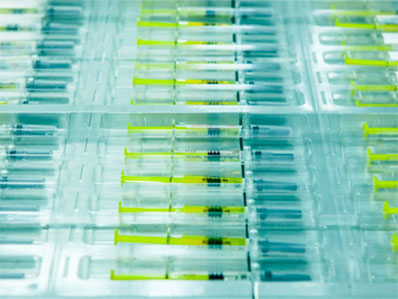Summary of financial results for the first quarter of 2020
Summary of financial results for the first quarter of 2020
- Operating revenue increased by 23% to 101.0 million euros in the first quarter of 2020, mainly driven by the strength of (i) the specialty pharmaceutical business, where sales rose 24%, strongly outperforming the pharmaceutical market, and (ii) the contract manufacturing business, which grew by 19%.
- The growth in operating revenue was underpinned by the sales of the heparin franchise (low-molecular-weight heparins (LMWHs) and other heparins), which increased 42% in the first quarter of 2020. Sales of LMWHs (enoxaparin biosimilar and bemiparin) increased 43%. Sales of the enoxaparin biosimilar increased 79% in the first quarter of 2020, while sales of bemiparin increased 15%.
- EBITDA was 20.0 million euros in the first quarter of 2020, reflecting growth of 68% compared with the same period of the preceding year and an improvement of 5.3 percentage points in the EBITDA margin, which rose to 19.8%. Likewise, net profit increased 102% to 13.9 million euros.
- ROVI filed its application for marketing authorisation for Doria® with the European health authority, the European Medicines Agency (EMA), through the Centralised Procedure on 27 December, 2019. After passing the validation phase satisfactorily, the dossier was admitted for evaluation on 30 January, 2020.











6S3A6968(3).jpg
Operating revenue increased by 23% to 101.0 million euros in the first quarter of 2020, mainly driven by the strength of the specialty pharmaceutical business, where sales rose 24%, strongly outperforming the pharmaceutical market, and the contract manufacturing business, which grew by 19%. Total revenue increased by 23% to 101.2 million euros in the first quarter of 2020.
Sales of prescription-based pharmaceuticals rose 27% to 79.7 million euros in the first quarter of 2020, outperforming the market by 16 percentage points. According to the consulting company IQVIA, the innovative product market in Spain rose by 11% in the first quarter of 2020 in comparison with the same period of 2019.
In addition, sales of the low-molecular-weight heparin (LMWH) franchise (low-molecular-weight heparins and other heparins) increased 42% to 55.6 million euros in the first quarter of 2020. Thus, heparin sales represented 55% of operating revenue in the first quarter of 2020 compared to 48% in the first quarter of 2019. Sales of low-molecular-weight heparins (bemiparin and the enoxaparin biosimilar) increased 43% to 53.9 million euros. Sales of the enoxaparin biosimilar rose 79% to 29.6 million euros in the first quarter of 2020, while bemiparin sales increased 15% to 24.3 million euros.
ROVI increases sales of its prescription-based products and contract manufacturing
In the first quarter of 2020, sales of Neparvis®, a prescription-based product from the company Novartis indicated for the treatment of adult patients with symptomatic chronic heart failure and reduced ejection fraction, which ROVI has been distributing in Spain since December 2016, increased 85%, totalling 7.9 million euros. Sales of Volutsa®, a prescription-based product from the company Astellas Pharma indicated for the treatment of moderate to severe storage symptoms and voiding symptoms associated with benign prostatic hyperplasia, increased by 23% to 3.8 million euros. Sales of contrast agents for diagnostic imaging and other hospital products rose 1% to 8.3 million euros.
Likewise, contract manufacturing sales rose 19%, totalling 12.7 million euros in the first quarter of 2020, driven mainly by the repositioning of the strategy of the contract manufacturing activity towards products with higher value-added
EBITDA grew by 68%, from 11.9 million euros in the first quarter of 2019 to 20.0 million euros in the first quarter of 2020. Likewise, ROVI’s net profit rose 102% to 13.9 million euros. Research and development expenses (R&D) were 4.5 million euros in the first quarter of 2020. These R&D expenses were mainly related to (i) the preparation of the Doria® registration dossier to be submitted to the U.S. Food and Drug Administration (FDA); (ii) the development of the Letrozole-ISM® Phase I trial; and (iii) the development of a new formulation of Risperidone-ISM® for a three-monthly injection.
ROVI continues growing through its subsidiaries and distribution agreements with third parties
ROVI commenced the marketing of its enoxaparin biosimilar in Germany in September 2017 and in UK, Italy, Spain, France, Austria, Latvia and Estonia in 2018;. Likewise, ROVI began marketing it in Portugal, Poland, Costa Rica, Finland and Sweden in 2019.
In addition to the European countries mentioned, as of September 2019, ROVI holds marketing agreements for its enoxaparin biosimilar in 87 countries. Among them, we can highlight the agreements with Hikma Pharmaceuticals PLC, a listed multinational pharmaceutical group (LSE:HIK), for the exclusive marketing of the enoxaparin biosimilar in 17 MENA (Middle East and North Africa) countries and the agreement with Sandoz, a division of Novartis AG and one of the world leaders in generic medicines and biosimilars, for the distribution and marketing of the products in 14 countries/regions (Australia, New Zealand, Philippines, Hong Kong, Singapore, Vietnam, Malaysia, Canada, South Africa, Brazil, Colombia, Argentina, Mexico and Central America).
ROVI registers its long-acting injectable antipsychotic, Doria®, in Europe and continues with the clinical development of Letrozole ISM®
In January 2020, the company announced that a very important milestone had been achieved with its long-acting injectable (LAI) antipsychotic Doria® (Risperidone ISM®). After the conclusion of the validation phase, the European health authorities have commenced the assessment process to grant marketing authorisation for this first product based on ROVI’s leading-edge drug delivery technology, ISM®. In March 2019, the company announced topline results from the pivotal study of Risperidone ISM® “PRISMA-3”1, which showed that primary and key secondary efficacy endpoints were achieved with both doses tested for the treatment of patients with acute exacerbation of schizophrenia. Likewise, in July 2019, the company announced the completion of the Clinical Trial Program that will support the application for marketing authorization for Doria® for the treatment of schizophrenia. In addition, an open-label extension of the PRISMA-3 study has already been completed and will provide clinical data on the long-term use of Risperidone ISM® (12 additional months).
Furthermore, ROVI informed of the decision to expand its industrial capabilities for the manufacture of Doria® with the incorporation of a second line for the manufacture of the syringe containing the solvent. The addition of this second line also provides the company with the necessary flexibility to initiate the preparation of the industrial filling processes of Letrozole ISM®, which will require the installation of a specific filling line. As a result, ROVI has prioritized the submission of the Doria® dossier in Europe (already done) and, subsequently, filing in the USA, targeting the second half of 2020.
In addition, the company has already announced the commencement of the clinical development of Letrozole ISM®, which represents the second candidate using ROVI’s ISM® technology platform. This new investigational medicine is, to the best of our knowledge, the first long-acting injectable aromatase inhibitor intended for the treatment of hormone-dependent breast cancer. The first phase I clinical trial (the LISA-1 study) of Letrozole ISM® is currently ongoing but, due to the study design (“dose escalation”) and its exploratory nature, the finalisation date cannot be known in advance. Nevertheless, preliminary data confirm that this ISM® formulation provides a prolonged release of letrozole which produces a sustained suppression of oestrogenic hormones. The company will be gathering more clinical data from this trial during the following months to better characterise the pharmacological profile of Letrozole ISM®. Subsequently in 2020, ROVI is planning to share these results with the regulatory authorities and discuss the next steps in order to continue with the clinical development of this novel long-acting injectable aromatase inhibitor.
Lastly, ROVI’s R&D team has recently started development of a new formulation of Risperidone ISM® for a three-monthly injection, which would complement the current formulation of Doria® for the maintenance treatment of patients with clinically stable schizophrenia. This development is still in an initial phase.
ROVI is betting on research and development as the company’s future growth driver. Juan López-Belmonte Encina, ROVI’s Chief Executive Officer, said that, “we will continue to grow over forthcoming hears due to the potential of ROVI’s R&D product portfolio. We are excited about the potential of ISM® technology; we confirmed the positive results of a Phase III study, the dossier of which we have just filed in Europe and are planning to file in the United States in the second half of 2020. Likewise, we are developing a Phase I for another candidate also with our ISM® technology. At the same time, we are now marketing enoxaparin in 13 countries and sales rose 79% in the first quarter of 2020. We are in an international expansion phase and hope that our enoxaparin biosimilar will allow us to be present in more than 120 countries in the long term. We are excited at the potential of our heparin franchise and aspire to become a global benchmark player in this field”.
Growth forecasts
For 2020, ROVI expects a mid-single-digit growth rate for the operating revenue The company expects to continue growing in line with the growth rate of pharmaceutical spending in Spain in the first quarter of 2020, which was 5%, according to the figures published by the Ministry of Health, Consumer Affairs and Social Welfare.
Notwithstanding, given the uncertainties associated to the development of the COVID-19 pandemic (which ROVI will continue to monitor closely) and the duration of the state of alarm, it is not yet possible to make a precise assessment of the impact that the pandemic will have on the current year. ROVI expects the main adverse impact on group sales to be in the second quarter of 2020.
ROVI expects its growth drivers to be bemiparin, the latest license agreements, such as Neparvis® and Volutsa®, the enoxaparin biosimilar, its existing portfolio of specialty pharmaceuticals, the new products acquired recently (Falithrom® and Polaramine®) and the new contracts in the contract manufacturing area.